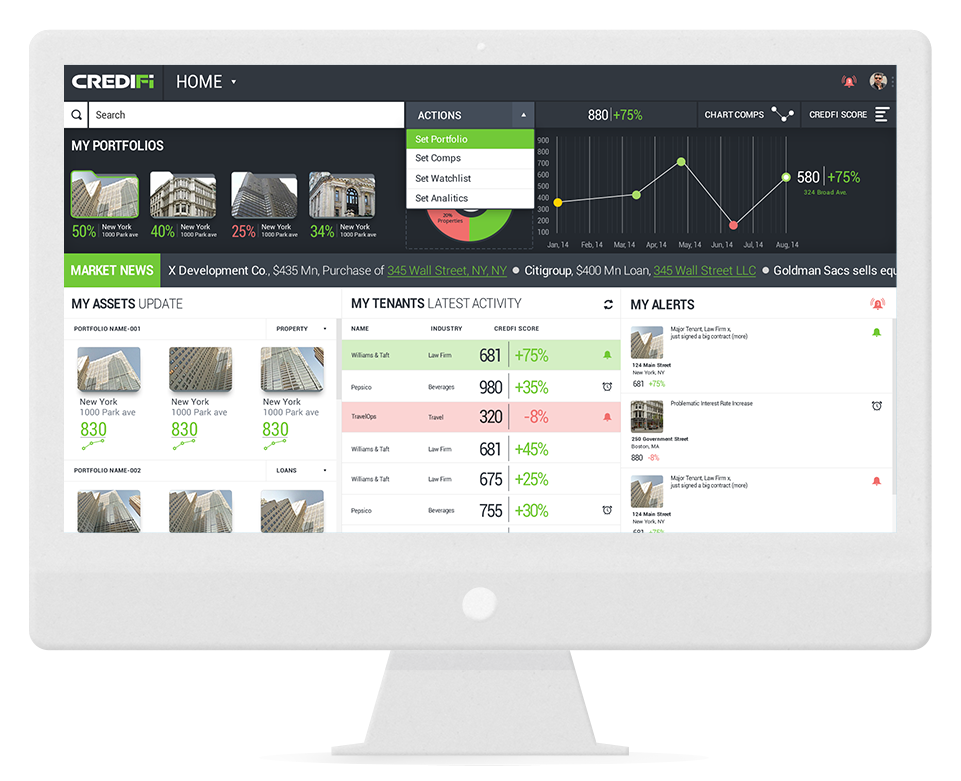

Big data analysis and data science techniques applied to public and private datasets is nothing new, but recent growth in the quality of information and its use in commercial real estate is. Commercial real estate is a $12 trillion industry and the ability to make better data-driven decisions can save time and money for almost everyone involved. Nearly every type of commercial real estate professional has been impacted by innovations in data technology at some level. Real estate investors and brokerage professionals are no exception as seen by the increasing number of venture capital-backed startups focused on building sophisticated new tools to serve the real estate investment community.
Companies like CrediFi and VTS use big data to create new ways of envisioning the value of a property. They use complex data to model the underlying credit quality of each tenant in real time in each asset and roll this information up into an overall score for a building, helping investors understand the risk and potential impacts to the valuation of a property. CrediFi also takes into account financial information related to the asset such as loan amount, rates and market comparable information to better help managers understand the performance of each asset and ultimately make material decisions around the value of their portfolio.

Real estate professionals can utilize big data to make strategic decisions rather than having to make decisions based on hunches or best practices. The clarity with which these new platforms present data has made the job of interpreting data easier. Being able to answer questions like, “Are we using a space efficiently?”, “How much foot traffic does an area get?” or “Does one part of the building consume more electricity?” are critical to maximizing return, but such questions haven’t always been the easiest to answer quickly. The latest rounds of innovation have even gone a step farther. Instead of presenting answers to questions like those above, innovations in machine learning have begun to provide answers to problems investors didn’t know they had. IBM’s Watson, a super-computing program, has been tested to provide predictive analytical support to real estate investors through it’s use of sensors and data processing. By testing correlations and looking for statistical relationships within tenant type, tenant credit and sensor enabled utilities; startups using Watson are attempting to create value to by letting investors know where inefficiencies are in real time. Some large companies have taken note and built their own systems to help add value.
“We’ve put sensors on the equipment in a building, for example, and every 15 seconds we get a read on the air temperature, if the fan is on or off. Then we can feed data into algorithms, like if this fan is working, then it shouldn’t generate a work order to fix it. We can also figure out, is weather data correlating to x, y or z.” – Richard Brown, JLL’s head of Business Intelligence in the U.S.

Innovations in big data are also helping investors serve their tenants more efficiently. For example, by deploying sensors that detect motion, light and temperature, big data can help investors track and understand how tenants interact and circulate within their space. This knowledge can go beyond eliminating waste (turning out lights or turning off air conditioning when tenants aren’t using the space) and can be applied to enhance marketing materials, aspects of floorplan design and eliminating traffic bottlenecks that can make buildings safer and more efficient. By understanding how to curate a better environment for tenants, investors could shift their tenant’s view that real estate leases are not just a set of expenses, but more of an asset that adds value to their business. According to Richard Brown, “Data scientists and analytics platforms for corporate real estate like JLL’s RED platform, can use predictive modeling to quantify and improve the value of a company’s real estate. Data is a powerful force to wield, whether it’s for a portfolio of 10 properties—or 10,000.”
Not long ago, Microsoft Excel was considered cutting edge technology. As sophistication and the benefits of new data tools increase, adoption may well be required to maintain an investment edge in commercial real estate. Would your business benefit from using these technologies? What new technologies have made the biggest impact to your business?
Sources:
https://techcrunch.com/2015/07/15/vts-raises-21m-to-bring-big-data-to-commercial-real-estate/
https://www.ibm.com/blogs/internet-of-things/real-impact-big-data-cre/
https://www.credifi.com/company/#company
https://www.cnbc.com/2015/08/04/how-big-data-is-transforming-real-estate.html
https://www.jllrealviews.com/trends/beyond-cost-bringing-sophistication-to-real-estate-valuation/
https://houseofit.ph/will-smart-buildings-future-trend-philippine-metropolis/
